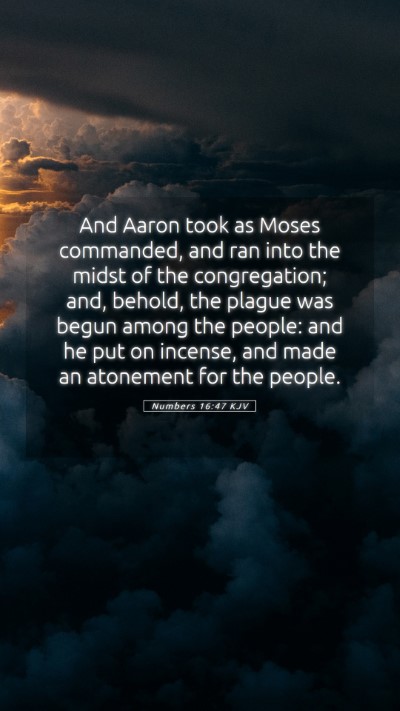Understanding Numbers 16:47
Numbers 16:47 states: "And Aaron took as Moses commanded, and ran into the midst of the congregation; and, behold, the plague was begun among the people: and he put on incense, and made an atonement for the people". This verse may seem simple on the surface, but it is rich with meaning and offers profound insights into Moses' leadership, Aaron's role as a priest, and God's nature as a just yet merciful deity. Below we explore the significance of this verse through various commentary perspectives.
Contextual Background
The context of Numbers 16 involves a significant rebellion against Moses' authority led by Korah, Dathan, and Abiram. Their insurrection resulted in serious consequences for the people of Israel. As God's judgment began to manifest in the form of a plague, the urgency of Aaron's actions takes center stage.
Verse Analysis by Commentators
Matthew Henry's Commentary
According to Matthew Henry, this verse emphasizes the quickness of Aaron’s response to the crisis. By running into the midst of the congregation with incense, he represents the priestly function of intercession, standing between God and the people. Henry highlights the significance of incense, symbolizing prayer and offering—a means of appeasing God's wrath. This act mirrors the need for mediation in human sinfulness, illustrating that only through Christ, our High Priest, can atonement be made.
Albert Barnes' Notes
Albert Barnes elaborates on the act of taking incense as a typical priestly duty. He notes that Aaron's behavior in this tense moment shows his dedication and urgency. Barnes points out that the term "atonement" clarifies Aaron's role as a mediator and that the incense symbolizes the prayers ascending to God. This act was essential for demonstrating God’s mercy, showcasing the importance of intercessory prayer within communal worship.
Adam Clarke's Commentary
Adam Clarke emphasizes the historical significance of Aaron's action. He notes that incense was burned in the Tabernacle to signify prayer and intercession. Clarke also discusses how Aaron's quick response reflects the attribute of God's readiness to forgive if a mediator is found. The use of incense as an offering in this plague narrative serves to highlight God’s willingness to restrain judgment, revealing His compassion amidst justice.
Theological Insights
The theological implications of Numbers 16:47 are significant for understanding the role of priests in Israel and the foreshadowing of Christ's atoning sacrifice. Aaron's act of running to make atonement serves as a vivid reminder of the priestly role in the Old Testament and the greater priestly ministry of Jesus.
Practical Application
For modern-day application, this verse encourages believers to recognize the importance of prayer and intercession in times of need. Just as Aaron intervened, we are called to pray for others and seek forgiveness for our communities. The urgency conveyed by Aaron’s actions serves as a call to action for believers to engage actively in spiritual and communal responsibilities.
Key Takeaways
- Urgent Intercession: Aaron's immediate action illustrates the need for quick responses in faith to the crises around us.
- Symbolism of Incense: Incense as a representation of prayer points to the significance of communication with God.
- Atonement and Mediation: Emphasizes the importance of intercessors in spiritual matters and foreshadows Christ's ultimate sacrifice.
Related Cross References
- Exodus 30:10 - The atonement of the people through the priest.
- Leviticus 16:12-13 - Aaron entering the Holy Place with incense.
- Hebrews 7:25 - Jesus as our eternal high priest making intercession for us.
Conclusion
Numbers 16:47 serves as a profound reminder of the roles of prayer, mediation, and atonement within the biblical narrative. By studying this verse, we glean insights into God's justice and mercy available through intercessory prayer—an encouragement for all Christians as they navigate spiritual life's complexities. Engaging with this scripture enriches our Bible study insights and enhances our understanding of Scripture, providing a robust foundation for deeper Bible verse interpretations.


